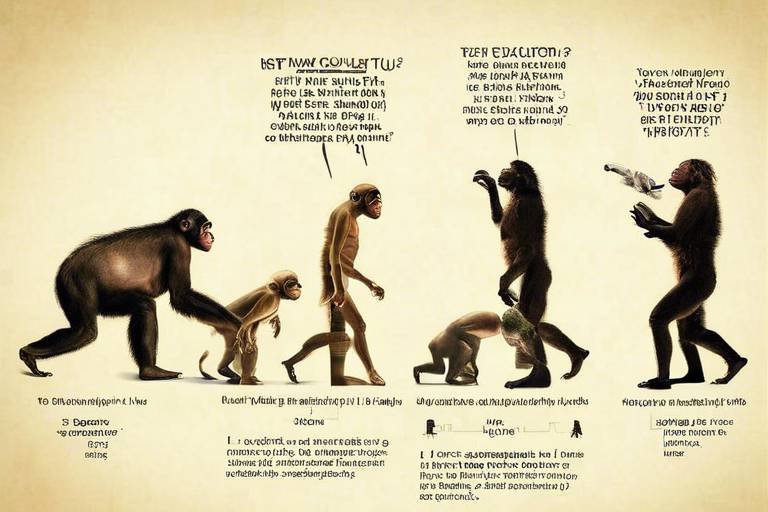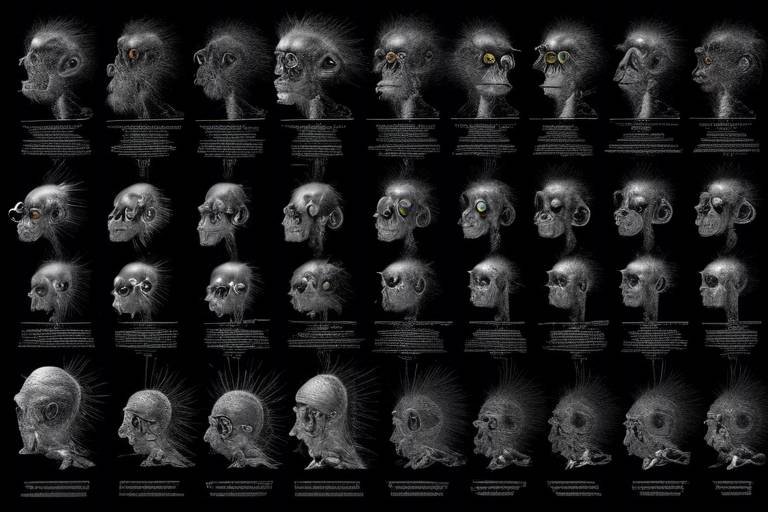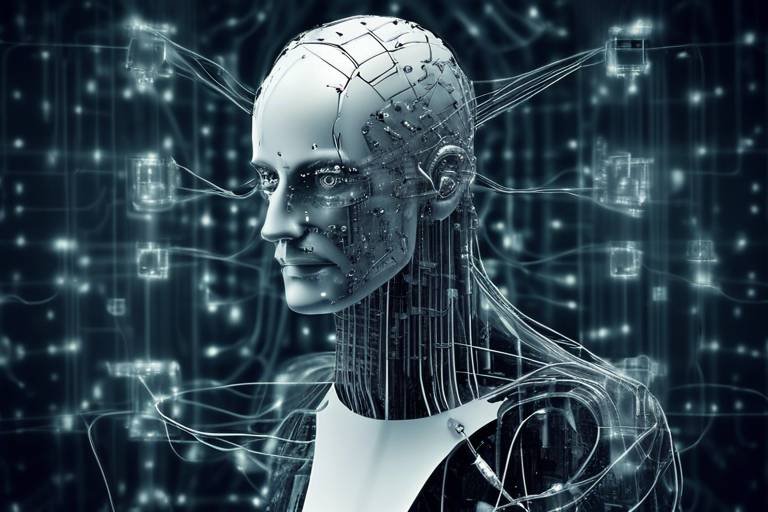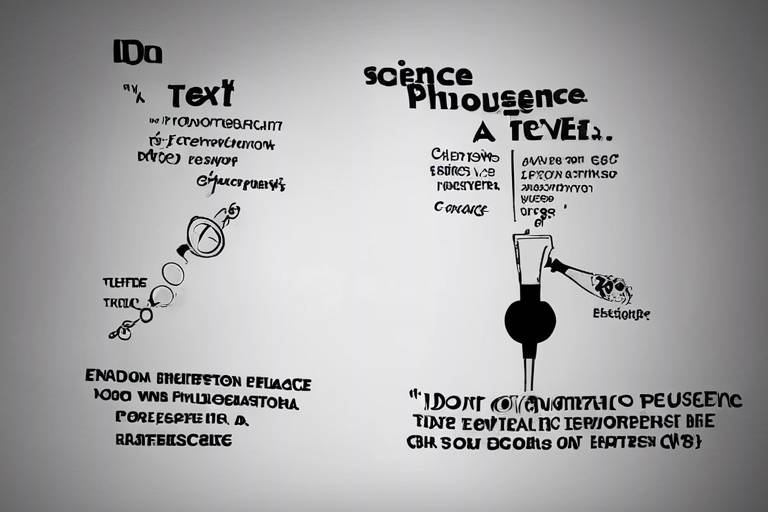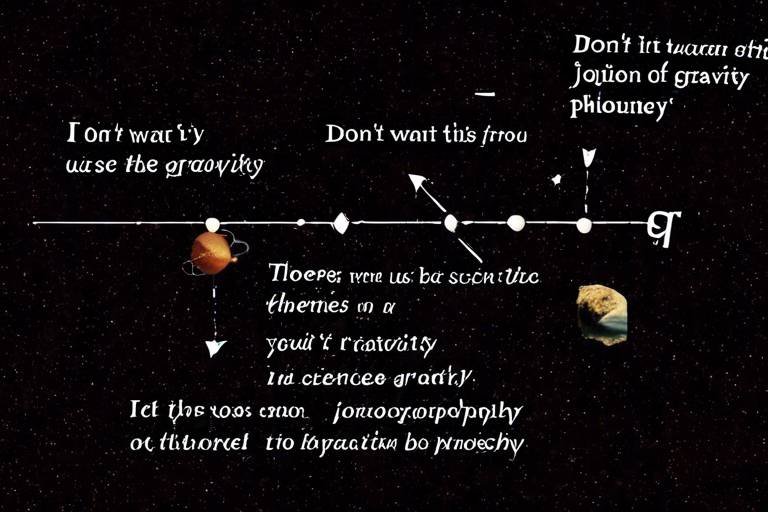Debating Evolution - Science or Philosophy?
The debate surrounding evolution is as old as the theory itself, igniting discussions that reach far beyond the confines of biology. This fascinating discourse raises a fundamental question: is evolution a scientific theory grounded in empirical evidence, or does it tread into the realm of philosophy, challenging our beliefs and perceptions of existence? To unpack this, we must consider both the scientific underpinnings of evolution and the philosophical implications that arise from it. It's a bit like peeling an onion; each layer reveals something new and sometimes makes you tear up a bit as you confront deeper truths about life and our place in it.
At its core, the scientific basis of evolution is supported by a plethora of evidence. Fossil records, for instance, act as a time capsule, capturing snapshots of life forms that existed millions of years ago. These fossils provide a chronological timeline that illustrates the gradual changes in species over time, akin to flipping through a history book that tells the story of life on Earth. Genetic studies further bolster this narrative, revealing how closely related different species are at a molecular level. The more we delve into these scientific findings, the clearer it becomes that evolution is not just a theory; it's a robust explanation for the diversity of life, backed by tangible proof.
However, the philosophical implications of evolution cannot be ignored. When we consider what evolution means for concepts like determinism and free will, we enter a realm of thought that challenges our understanding of existence itself. For instance, if our behaviors and choices are shaped by millions of years of evolutionary pressures, to what extent are we truly free? This question echoes through the corridors of philosophy, prompting debates that have persisted for centuries. It’s like standing at a crossroads, where one path leads to scientific inquiry and the other to philosophical reflection, each offering unique insights into the human experience.
Moreover, evolution compels us to rethink the nature of knowledge itself. Traditional epistemologies, which often prioritize human reason and experience, may need to adapt in light of evolutionary theory. This shift encourages a more holistic view of knowledge acquisition, where scientific inquiry plays a pivotal role in shaping our understanding of the world. Observation, for instance, is a cornerstone of scientific methodology, particularly in evolutionary biology. Scientists rely on observable phenomena—such as adaptations in species and changes in ecosystems—to substantiate their claims. It’s like being a detective piecing together clues to solve a mystery; each observation adds depth to our understanding of life's complexities.
Hypothesis testing is another critical aspect of evolutionary science. Scientists formulate hypotheses based on existing knowledge and then rigorously test them to validate evolutionary mechanisms. This process is akin to a trial by fire, where ideas must withstand scrutiny and experimentation before being accepted into the scientific canon. The iterative nature of hypothesis testing not only strengthens the scientific foundation of evolution but also highlights the dynamic and ever-evolving nature of scientific knowledge itself.
As we navigate through the implications of evolution, ethical considerations arise that warrant our attention. The debates surrounding genetic engineering, conservation efforts, and our responsibilities toward other species are deeply intertwined with evolutionary theory. For instance, as we gain the ability to manipulate genetic material, we must grapple with the ethical ramifications of such power. Are we playing God, or are we simply taking the next step in our evolutionary journey? This ethical landscape is complex and multifaceted, requiring a careful balance between scientific advancement and moral responsibility.
In summary, the debate over whether evolution is a scientific theory or a philosophical concept is not merely academic; it has real-world implications that affect education, religion, and societal values. As we continue to explore this intricate web of ideas, one thing becomes clear: evolution is a powerful lens through which we can examine not only the biological world but also our own beliefs and philosophies about life.
- What is the main evidence supporting evolution?
Fossil records, genetic studies, and observable changes in species over time provide robust evidence for evolution. - How does evolution challenge traditional beliefs?
Evolution raises questions about free will, determinism, and the nature of existence, prompting a reevaluation of our understanding of life. - What are the ethical implications of evolutionary theory?
Debates surrounding genetic engineering and conservation highlight the responsibilities humanity has toward other species. - Why is it important to teach evolution in schools?
A comprehensive understanding of evolution fosters scientific literacy and critical thinking skills in students.

The Scientific Basis of Evolution
When we dive into the scientific basis of evolution, we're not just swimming in a pool of theories; we’re plunging into a vast ocean of empirical evidence that has transformed our understanding of life on Earth. Evolution, at its core, is a process that explains how species change over time through mechanisms like natural selection and genetic drift. This isn’t just a whimsical idea; it’s backed by a mountain of data collected over centuries. From fossil records to genetic studies, the evidence is as compelling as it is diverse.
Let’s start with fossil records. These are like nature’s scrapbook, capturing snapshots of life from millions of years ago. Fossils provide a timeline that helps scientists piece together the evolutionary history of various species. For instance, the transition from fish to amphibians is documented through a series of fossils that showcase gradual changes in anatomy. Each discovery adds a new layer to our understanding, much like assembling a jigsaw puzzle where each piece reveals a clearer picture of our biological past.
Moreover, genetic studies have revolutionized our grasp of evolution. By analyzing DNA, scientists can trace the lineage of species and understand the genetic variations that drive evolutionary change. For example, the similarities in DNA sequences among different species illustrate how closely related they are. This genetic evidence supports the idea of a common ancestor, suggesting that all life is interconnected in a grand tapestry of evolution. To put it simply, our genes tell a story—one that links us to every other living organism in a profound way.
In addition to fossils and genetics, we must consider the role of observation in science. Evolutionary biology heavily relies on observable phenomena to substantiate its claims. Scientists often conduct field studies to observe natural selection in action. A classic example is the study of the peppered moth during the Industrial Revolution in England. As pollution darkened tree trunks, the lighter-colored moths became more visible to predators, while darker moths thrived. This real-time observation powerfully illustrates how environmental changes can influence evolutionary outcomes.
Another critical aspect is hypothesis testing. Scientists formulate hypotheses about how evolutionary processes work and then design experiments or observational studies to test these ideas. For instance, researchers might hypothesize that a certain trait provides a survival advantage in a specific environment. They can then collect data to support or refute this hypothesis, allowing for a dynamic and self-correcting understanding of evolutionary mechanisms. This process is akin to a detective piecing together clues to solve a mystery—each test brings us closer to the truth.
To summarize, the scientific basis of evolution is founded on a robust framework of evidence, observation, and experimentation. It’s not merely a philosophical concept; it’s a well-supported scientific theory that explains the diversity of life on our planet. By examining fossils, analyzing genetic data, and applying rigorous scientific methods, we gain insights that not only deepen our understanding of biology but also challenge us to reconsider our place in the natural world.
- What is evolution? Evolution is the process by which species change over time through mechanisms such as natural selection and genetic drift.
- How do scientists study evolution? Scientists study evolution through fossil records, genetic analysis, and observational studies of living organisms.
- What evidence supports evolution? Evidence for evolution includes fossil records, genetic similarities among species, and observable changes in populations over time.
- Why is evolution important? Understanding evolution is crucial for grasping the interconnectedness of life and the processes that drive biological diversity.

Philosophical Implications of Evolution
The discussion surrounding evolution is not merely confined to the realm of science; it spills over into the rich tapestry of philosophy, raising questions that have intrigued thinkers for centuries. At its core, evolution challenges our understanding of determinism and free will. If our species evolved through a series of chance mutations and natural selection, what does that say about our choices and the very essence of our existence? Are we simply products of our environment, or do we possess the agency to shape our destinies? These questions are not just academic; they resonate deeply within our lives, influencing how we perceive ourselves and our place in the universe.
Moreover, the implications of evolutionary theory extend into the realms of ethics and morality. If we accept that we are the result of evolutionary processes, we might begin to question the foundations of our moral frameworks. For instance, is morality an inherent trait shaped by evolutionary pressures, or is it a social construct? This philosophical inquiry can lead to a more profound understanding of human behavior, prompting us to consider whether our ethical systems are adaptable, much like species themselves. This invites a fascinating discussion on the nature of existence, where we find ourselves pondering the purpose of life in a universe governed by chance.
Additionally, the theory of evolution encourages us to rethink the nature of knowledge itself. Traditional epistemologies often rely on absolutes, but evolution suggests that our understanding is constantly evolving. This leads us to consider how we acquire knowledge in the first place. Are we simply accumulating facts, or are we engaging in a dynamic process of discovery? In this light, we can appreciate how scientific inquiry serves as a tool for navigating the complexities of our world, allowing us to challenge preconceived notions and embrace the uncertainties that come with new discoveries.
As we delve deeper into the philosophical implications of evolution, we encounter the notion that our understanding of knowledge is inherently linked to the evolutionary process. The very act of questioning and seeking answers is a reflection of our evolved cognitive abilities. This leads us to a critical examination of how we validate what we know. The scientific method, with its emphasis on observation and experimentation, provides a framework for understanding our environment, yet it also raises philosophical questions about the nature of truth and belief.
Observation plays a pivotal role in scientific methodology, especially in evolutionary biology. The reliance on observable phenomena to substantiate claims is fundamental to the scientific process. For instance, consider the fossil record, which serves as a historical narrative of life's evolution. Each discovery not only adds to our understanding but also challenges existing paradigms, forcing us to reconsider what we know. This iterative process of observation and hypothesis testing reflects the dynamic nature of knowledge itself, suggesting that our understanding will continue to evolve as new evidence emerges.
Hypothesis testing is another cornerstone of evolutionary science. Scientists formulate hypotheses based on existing data, then design experiments or observational studies to test these ideas. This rigorous process not only validates evolutionary mechanisms but also illustrates the philosophical underpinnings of scientific inquiry. It reveals a commitment to questioning, adapting, and refining our understanding of the natural world. The interplay between hypothesis and evidence is a dance of discovery, where each step forward can lead to new insights and further questions.
In conclusion, the philosophical implications of evolution are vast and multifaceted. They compel us to reflect on our beliefs about existence, knowledge, and morality. As we continue to explore these ideas, we are reminded that evolution is not just a scientific theory; it is a profound lens through which we can examine the complexities of life and our role within it.
- What are the main philosophical questions raised by evolution? Evolution raises questions about determinism, free will, and the nature of existence, challenging our understanding of morality and knowledge.
- How does evolution influence our ethical frameworks? It prompts us to consider whether morality is an inherent trait shaped by evolutionary pressures or a social construct.
- What role does observation play in understanding evolution? Observation is crucial in validating evolutionary claims, as it allows scientists to gather evidence and challenge existing paradigms.
- Why is hypothesis testing important in evolutionary science? Hypothesis testing helps validate the mechanisms of evolution and illustrates the dynamic nature of scientific inquiry.

Evolution and the Nature of Knowledge
When we dive into the world of evolution, it's like opening a door to a room filled with questions about how we know what we know. Evolution isn't just a biological theory; it's a profound challenge to our understanding of knowledge itself. Think about it: if everything around us, including ourselves, has evolved over millions of years, what does that say about the way we acquire knowledge? Are we simply products of our environment, or do we have some control over our understanding? This is where the intersection of science and philosophy becomes particularly intriguing.
At its core, evolution prompts us to reconsider traditional epistemologies—those systems that dictate how we come to know things. For centuries, knowledge has been viewed through a lens of certainty, often relying on absolute truths. However, the theory of evolution introduces a dynamic perspective. It suggests that knowledge, much like species, adapts and evolves over time, shaped by new discoveries and insights. This leads us to ask: can we ever truly know anything in an absolute sense, or is all knowledge subject to change?
One of the most exciting aspects of evolutionary theory is how it encourages a more scientific approach to understanding our world. By relying on observation and experimentation, we can gather evidence that supports or refutes our ideas. This is where the role of scientific inquiry becomes crucial. Knowledge isn't just handed down; it's something we actively engage with, test, and refine. The scientific method allows us to challenge our assumptions and become better thinkers. As we observe the natural world, we gain insights that can reshape our understanding.
Scientific inquiry is not just a process; it’s the lifeblood of knowledge. In evolutionary biology, scientists rely heavily on observable phenomena to substantiate their claims. For example, the fossil record serves as a timeline of life on Earth, showcasing the gradual changes that species undergo. Each fossil tells a story, contributing to our understanding of how life has diversified. Moreover, advancements in genetic studies have provided a molecular basis for evolution, revealing the intricate connections between species that were previously thought to be unrelated.
This emphasis on observation and evidence leads us to a crucial realization: knowledge is not static. It is a living, breathing entity that grows and changes as we learn more. This dynamic nature of knowledge encourages a culture of curiosity and skepticism, prompting us to continually ask questions and seek out new information. In this way, evolution serves as a metaphor for knowledge itself—constantly adapting and evolving in response to new challenges and discoveries.
Another key aspect of how evolution influences our understanding of knowledge is through hypothesis testing. In the realm of evolutionary science, formulating hypotheses is essential for validating the mechanisms that drive evolution. Scientists propose hypotheses based on observations and then design experiments or studies to test these ideas. This iterative process of testing, refining, and retesting is fundamental to scientific progress.
For instance, researchers might hypothesize that a particular trait in a species provides a survival advantage in a specific environment. They can then conduct field studies to observe whether this trait indeed correlates with higher survival rates. If the evidence supports the hypothesis, it strengthens our understanding of evolutionary processes. If not, scientists must reconsider their assumptions and explore alternative explanations. This cycle of inquiry not only deepens our knowledge but also illustrates the fluidity of understanding in the face of new evidence.
In conclusion, the relationship between evolution and the nature of knowledge is a fascinating one. It challenges us to think critically about how we acquire knowledge, emphasizing the importance of scientific inquiry and observation. As we continue to explore the mysteries of evolution, we are reminded that knowledge is not merely a collection of facts; it is a dynamic process that evolves alongside our understanding of the world. Embracing this perspective can lead to a more profound appreciation of the complexity of life and the interconnectedness of all living things.
- What is the significance of evolution in understanding knowledge? Evolution challenges traditional views of knowledge, suggesting that it is not static but rather dynamic and subject to change.
- How does scientific inquiry relate to evolutionary theory? Scientific inquiry relies on observation and hypothesis testing to validate claims, making it essential for understanding evolutionary processes.
- Can knowledge evolve like species do? Yes, just as species adapt over time, our understanding and knowledge can also evolve based on new discoveries and insights.

The Role of Observation in Science
Observation plays a crucial role in the realm of science, acting as the foundational pillar upon which theories are built and validated. In the context of evolutionary biology, observation is not merely a passive act; it is an active engagement with the natural world that allows scientists to gather data, formulate hypotheses, and draw conclusions. Imagine a detective piecing together clues to solve a mystery—this is akin to how scientists observe phenomena to understand the complexities of evolution.
Through careful observation, researchers have amassed a wealth of evidence that supports evolutionary theory. For instance, the study of fossil records provides a chronological glimpse into the past, revealing how species have changed over millions of years. Each fossil serves as a snapshot in time, illustrating the gradual modifications that organisms undergo. Similarly, genetic studies allow scientists to observe the minute differences and similarities between species, further validating the connections drawn from evolutionary theory.
Moreover, observation is not limited to just the past; it also encompasses the present. Scientists observe living organisms in their natural habitats, studying behaviors, interactions, and adaptations. This ongoing observation helps to refine existing theories and sometimes even leads to new discoveries. For example, the observation of the Galápagos finches by Charles Darwin highlighted how environmental factors can drive evolutionary change, a concept that remains pivotal in evolutionary biology today.
In the scientific methodology, the act of observation is often followed by hypothesis testing. Once a phenomenon is observed, scientists formulate hypotheses that can be tested through experiments and further observations. This cyclical process ensures that scientific knowledge is constantly evolving and adapting based on new evidence. As we delve deeper into the role of observation, it’s essential to recognize that it is not just about seeing; it’s about understanding the context and significance of what we observe.
To illustrate the importance of observation in evolutionary science, consider the following table that summarizes key observational methods used by scientists:
| Observation Method | Description | Example |
|---|---|---|
| Field Studies | Observing organisms in their natural environments. | Studying animal behavior in the wild. |
| Laboratory Experiments | Controlled experiments to test specific hypotheses. | Genetic manipulation of organisms. |
| Comparative Anatomy | Studying anatomical structures across different species. | Comparing bone structures in vertebrates. |
| Genetic Analysis | Examining DNA sequences to understand evolutionary relationships. | Sequencing the genome of various species. |
In conclusion, observation is not just a tool; it is the very essence of scientific inquiry. It allows scientists to connect the dots, to see beyond the surface, and to explore the intricate tapestry of life that evolution weaves. As we continue to observe and learn, we deepen our understanding of not only evolution but also the broader mysteries of existence itself.
- What is the significance of observation in science?
Observation is essential as it provides the data needed to formulate hypotheses and validate scientific theories. - How does observation contribute to our understanding of evolution?
Through observation, scientists can collect evidence from fossil records and living organisms, which supports evolutionary theory. - Can observation lead to new scientific discoveries?
Absolutely! New observations can challenge existing theories and lead to groundbreaking discoveries in science.

Hypothesis Testing in Evolutionary Science
When we think about the concept of evolution, it’s easy to get lost in the vastness of time and the complexity of life forms. However, at the heart of evolutionary biology lies a robust framework for understanding how life changes over generations: hypothesis testing. This scientific method is crucial for validating the mechanisms of evolution, allowing researchers to formulate, test, and refine their ideas based on empirical evidence.
In evolutionary science, hypothesis testing begins with a question or a prediction about how certain factors influence evolutionary processes. For instance, scientists might ask, “How does natural selection affect the traits of a population over time?” From this question, they can develop a hypothesis, such as “Populations with favorable traits will have higher survival rates.” This hypothesis can then be tested through various methods, including field studies, laboratory experiments, and genetic analysis.
One of the key aspects of hypothesis testing is the formulation of testable predictions. These predictions must be measurable and observable, allowing scientists to collect data that either supports or refutes the initial hypothesis. For example, researchers might track the survival rates of different colored moths in an environment where predation plays a significant role. If the data shows that darker moths have higher survival rates due to better camouflage, the hypothesis gains support, reinforcing our understanding of natural selection.
Moreover, hypothesis testing in evolutionary science is not a one-time event. It’s a continuous cycle that involves refinement and repetition. As new data emerges, existing hypotheses may be challenged, leading to further questions and new hypotheses. This iterative process is essential for scientific progress, ensuring that our understanding of evolution remains dynamic and adaptable to new findings.
Additionally, the importance of statistical analysis cannot be overstated in hypothesis testing. Scientists use statistical methods to determine whether the observed results are significant or if they could have occurred by chance. This rigorous approach helps to ensure that conclusions drawn from the data are reliable and valid, further solidifying the scientific basis of evolutionary theory.
To illustrate the process of hypothesis testing in evolutionary science, consider the following table that outlines the steps involved:
| Step | Description |
|---|---|
| 1. Formulate Hypothesis | Develop a clear, testable statement based on observations. |
| 2. Design Experiment | Create a study or experiment to collect relevant data. |
| 3. Collect Data | Gather data through observation, experimentation, or simulation. |
| 4. Analyze Results | Use statistical methods to interpret the data and assess significance. |
| 5. Draw Conclusions | Determine whether the data supports or refutes the hypothesis. |
| 6. Revise Hypothesis | Refine the hypothesis based on findings and repeat the process. |
This structured approach not only enhances the credibility of evolutionary science but also fosters a deeper understanding of the intricate processes that drive the diversity of life on Earth. By continuously testing and refining hypotheses, scientists can uncover the mechanisms behind evolutionary changes, shedding light on the complex interplay of genetics, environment, and adaptation.
In conclusion, hypothesis testing is a fundamental component of evolutionary science. It transforms abstract ideas into tangible, testable predictions, allowing scientists to explore the mysteries of life with precision and rigor. As we continue to investigate the wonders of evolution, this method will remain a cornerstone of our quest for knowledge, driving us toward a more profound understanding of our place within the tapestry of life.
- What is a hypothesis in evolutionary biology? A hypothesis is a testable statement or prediction about how certain factors influence evolutionary processes.
- Why is hypothesis testing important? It allows scientists to validate their ideas through empirical evidence, ensuring that conclusions are based on reliable data.
- How do scientists test their hypotheses? Through experiments, field studies, and statistical analysis to collect and interpret data.
- Can a hypothesis be proven true? A hypothesis can be supported by data, but it can never be proven absolutely true; it may be refined or rejected based on new evidence.

Ethical Considerations in Evolutionary Theory
The discussion around evolutionary theory isn't just confined to scientific circles; it permeates ethical considerations that affect our society at large. As we delve deeper into the implications of evolutionary biology, we must grapple with the moral responsibilities that arise from our understanding of life's processes. For instance, the advent of genetic engineering and biotechnology prompts us to ask: What ethical boundaries should we establish? The capacity to manipulate genes raises profound questions about the extent to which we should intervene in natural processes. Should we play 'God' and alter the genetic makeup of organisms, including ourselves? This dilemma is not merely academic; it has real-world consequences that can shape the future of humanity.
Moreover, the concept of conservation is intricately linked to evolutionary theory. As we recognize the interconnectedness of all life forms, we are faced with ethical obligations to protect endangered species and their habitats. The extinction of a species isn't just a loss of biodiversity; it represents a failure to uphold our duty as stewards of the planet. This sense of responsibility extends to the ethical treatment of animals in evolutionary research, where the methods and purposes of such studies must be scrutinized to ensure they align with humane principles.
Furthermore, the implications of evolutionary theory challenge our understanding of human nature itself. If we accept that humans are products of evolutionary processes, what does that mean for our concepts of morality, free will, and societal norms? Some argue that an evolutionary perspective could lead to a deterministic view of human behavior, undermining the foundations of ethics and accountability. This perspective raises important questions: Are our actions predetermined by our genetic makeup? Or do we possess the agency to shape our destinies, despite our evolutionary past? These philosophical inquiries are essential for understanding the broader implications of evolution on human society.
To further illustrate the ethical considerations, we can categorize them into key areas:
- Genetic Engineering: The manipulation of genetic material raises questions about the moral implications of 'designing' life forms.
- Conservation Efforts: The responsibility to protect endangered species and their habitats is rooted in our understanding of evolutionary relationships.
- Animal Welfare: Ethical treatment of animals used in research is paramount, ensuring humane practices in scientific inquiry.
- Human Behavior: The implications of viewing human actions through an evolutionary lens challenge traditional notions of free will and morality.
In summary, the ethical considerations surrounding evolutionary theory extend far beyond the laboratory. They touch upon our responsibilities to other species, the environment, and even ourselves. As we continue to explore and understand evolution, we must engage in ongoing dialogues about the ethical frameworks that guide our actions. This engagement is crucial for ensuring that our advancements in science align with our moral values, fostering a society that respects both the complexity of life and the responsibilities that come with that understanding.
- What are the main ethical concerns related to genetic engineering? Genetic engineering raises questions about the morality of altering life forms, potential risks to ecosystems, and the implications of 'playing God.'
- How does evolutionary theory impact conservation efforts? Understanding evolutionary relationships helps prioritize species for conservation, emphasizing the importance of biodiversity.
- What is the relationship between evolution and human behavior? Evolutionary theory can influence our understanding of human behavior, raising questions about free will and moral responsibility.

Evolution in Education
When it comes to teaching evolution in schools, the conversation can get quite heated. It’s not just about science; it’s about beliefs, values, and how we perceive our place in the universe. The controversy often stems from the clash between scientific understanding and creationist perspectives. Some argue that evolution undermines religious teachings, while others assert that it is a fundamental concept essential for understanding biology. This tension raises critical questions about what should be taught in the classroom and how educators can navigate these complex waters.
In many regions, particularly in the United States, the teaching of evolution faces significant challenges. Some states have attempted to introduce laws that allow for the inclusion of creationism or intelligent design in science curricula. This can create a confusing environment for students, who may struggle to reconcile scientific facts with their personal beliefs. The need for scientific literacy is more crucial than ever, as it equips students with the tools to critically analyze information and make informed decisions about the world around them.
To effectively teach evolution, educational systems must prioritize comprehensive science education that emphasizes critical thinking. This involves not only presenting the evidence for evolution but also addressing the misconceptions that students may have. For instance, many students might think that evolution is just a theory in the colloquial sense, not understanding that in scientific terms, a theory is a well-substantiated explanation based on a body of evidence.
Moreover, educators can adopt various strategies to enhance the teaching of evolution:
- Interactive Learning: Engaging students through hands-on activities, such as exploring fossil records or conducting genetic experiments, can help demystify evolutionary concepts.
- Critical Discussions: Facilitating open discussions about the implications of evolution can encourage students to express their views and understand different perspectives.
- Integrating Technology: Utilizing digital resources, such as documentaries and interactive simulations, can make learning about evolution more relatable and impactful.
Despite these efforts, the public perception of evolution varies widely across different cultures and regions. In some countries, evolution is widely accepted and integrated into the educational framework, while in others, it remains a contentious issue. The following table illustrates the global attitudes towards evolution education:
| Country | Acceptance of Evolution (%) | Inclusion in Curriculum |
|---|---|---|
| United States | 40 | Varies by state |
| United Kingdom | 80 | Mandatory |
| Brazil | 60 | Mandatory |
| Turkey | 30 | Limited |
| Japan | 75 | Mandatory |
This table highlights the disparities in acceptance and educational practices regarding evolution across different countries. The implications of these differences are profound, affecting not only scientific literacy but also how future generations will engage with critical scientific issues.
Ultimately, the teaching of evolution in education is not just about imparting knowledge; it’s about fostering a culture of inquiry and understanding. As educators, we have the responsibility to ensure that students receive a well-rounded education that encourages them to explore the wonders of life and the universe, grounded in scientific evidence. By doing so, we prepare them to navigate an increasingly complex world where science and philosophy often intersect.
Q: Why is evolution often controversial in education?
A: The controversy primarily arises from the clash between scientific evidence for evolution and certain religious beliefs that advocate for creationism or intelligent design.
Q: How can teachers effectively address students' concerns about evolution?
A: Teachers can create an open environment for discussion, provide clear scientific explanations, and use interactive learning methods to engage students.
Q: What role does scientific literacy play in understanding evolution?
A: Scientific literacy empowers students to critically evaluate information, understand scientific concepts, and make informed decisions based on evidence.

Curriculum Development and Evolution
The integration of evolution into educational curricula is not just a matter of scientific accuracy; it’s a reflection of how we understand the world around us. As educators grapple with the complexities of teaching evolution, they must navigate a landscape filled with both scientific evidence and cultural sensitivities. In many regions, the teaching of evolution faces significant challenges, often stemming from religious beliefs that conflict with scientific explanations. This has led to a polarized debate about what should be included in science curricula.
To foster a comprehensive understanding of biological concepts, it is essential that educational systems embrace evolution as a foundational element of life sciences. This means not only presenting the facts but also encouraging critical thinking and inquiry. For example, students should be exposed to the various lines of evidence that support evolutionary theory, including:
- Fossil records that illustrate the gradual changes in species over time.
- Genetic studies that reveal the connections between different organisms.
- Observations of natural selection in action, such as antibiotic resistance in bacteria.
Moreover, the curriculum should be designed to challenge students to question and explore the implications of evolution. By engaging with the material on a deeper level, students can appreciate not just the mechanics of evolution but also its philosophical and ethical dimensions. This holistic approach is crucial in developing scientifically literate individuals who can contribute meaningfully to society.
Incorporating evolution into the curriculum also requires addressing misconceptions that students may have. Many students enter the classroom with preconceived notions about evolution, often influenced by media portrayals or religious teachings. Educators must be equipped with strategies to address these misconceptions effectively. Professional development for teachers is key, ensuring they are comfortable discussing evolution and can provide students with accurate information.
Furthermore, educational policymakers play a significant role in shaping how evolution is taught. They must advocate for curricula that reflect scientific consensus while also considering the diverse beliefs of the communities they serve. This balancing act can be challenging, but it is essential for fostering an environment where scientific inquiry is valued. To illustrate the current state of evolution education, consider the following table that outlines the status of evolution education across different regions:
| Region | Evolution Education Status | Challenges Faced |
|---|---|---|
| North America | Generally included in curricula, but often contested. | Creationist movements and legal challenges. |
| Europe | Widely accepted and taught in most countries. | Some resistance in specific communities. |
| Asia | Varies significantly by country; some embrace it, others reject it. | Cultural beliefs and educational policies. |
| Africa | Incorporation of evolution varies; often under-resourced. | Lack of materials and teacher training. |
Ultimately, the goal of curriculum development in relation to evolution should be to inspire curiosity and a lifelong love of learning. By presenting evolution not just as a series of facts to memorize but as a dynamic and ongoing process, educators can help students understand the relevance of evolution to their lives. As we continue to explore the mysteries of life on Earth, it is essential that our educational systems reflect the best of what science has to offer, preparing students to engage with both scientific and philosophical questions in a thoughtful and informed manner.
- Why is evolution important to teach in schools? Evolution provides a foundational understanding of biology and helps students grasp the interconnectedness of life.
- What challenges do educators face when teaching evolution? Educators often encounter resistance from students and parents who hold religious beliefs that conflict with evolutionary theory.
- How can teachers effectively address misconceptions about evolution? Teachers can use evidence-based approaches and engage students in discussions that promote critical thinking.

Public Perception of Evolution
The public perception of evolution is a complex tapestry woven from threads of culture, religion, education, and individual beliefs. In many parts of the world, evolution is embraced as a cornerstone of biological science, yet in others, it faces staunch opposition rooted in religious or philosophical convictions. This divergence raises an intriguing question: how does one reconcile scientific understanding with deeply held beliefs? The answer lies in examining the various factors that shape public attitudes towards evolutionary theory.
In countries like the United States, the debate over evolution often mirrors broader cultural conflicts. For example, a significant portion of the population identifies with creationist views, which assert that life was created by a divine being. This perspective is not merely a scientific disagreement; it represents a fundamental clash of worldviews. Polls indicate that around 40% of Americans reject the idea of evolution, believing instead in a literal interpretation of religious texts. This statistic highlights the challenge educators face when introducing evolutionary concepts in classrooms.
Interestingly, education plays a pivotal role in shaping perceptions of evolution. Studies show that individuals who receive comprehensive science education are more likely to accept evolutionary theory. As students delve into the intricacies of natural selection, genetic variation, and fossil records, they begin to appreciate the robust evidence supporting evolution. Conversely, when evolution is excluded from curricula or presented alongside creationist perspectives, it can lead to confusion and skepticism among students.
Globally, the acceptance of evolution varies widely. For instance, in many European countries, a high percentage of the population accepts evolution as a valid explanation for the diversity of life. In contrast, in regions where religious beliefs dominate, such as parts of the Middle East and Africa, acceptance rates can plummet. This disparity is often reflected in educational systems, where the teaching of evolution may be limited or entirely absent.
To further illustrate these differences, let's take a look at a table that summarizes the acceptance of evolution across various regions:
| Region | Acceptance of Evolution (%) |
|---|---|
| North America | 60 |
| Europe | 80 |
| Middle East | 30 |
| Africa | 40 |
| Asia | 55 |
As we can see from the table, there is a stark contrast in the acceptance of evolution between different regions. This variation is not just a statistic; it reflects the underlying beliefs and values that influence how individuals understand their place in the natural world.
Moreover, media portrayal of evolution plays a significant role in shaping public perception. Documentaries, articles, and books that present evolution in an engaging and accessible manner can foster greater understanding and acceptance. On the flip side, sensationalized or misleading representations can perpetuate myths and misconceptions about evolutionary theory, further entrenching skepticism.
Ultimately, the public perception of evolution is a dynamic and evolving narrative. As science education continues to develop and as society grapples with the implications of evolutionary theory, there is hope for greater acceptance and understanding. Encouraging open dialogues, promoting scientific literacy, and addressing misconceptions can pave the way for a more informed public that appreciates the wonders of evolution.
- What is evolution? Evolution is the process by which species change over time through mechanisms such as natural selection and genetic drift.
- Why do some people reject evolution? Many people reject evolution due to religious beliefs, cultural influences, or a lack of understanding of the scientific evidence.
- How can education improve acceptance of evolution? Comprehensive science education that emphasizes critical thinking and evidence-based reasoning can help foster a better understanding of evolutionary concepts.
- What role does media play in shaping perceptions of evolution? Media can influence public perception by either accurately portraying evolutionary science or perpetuating misconceptions through sensationalism.
Frequently Asked Questions
- What is the scientific basis of evolution?
The scientific basis of evolution is grounded in empirical evidence gathered from various fields, including paleontology and genetics. Fossil records provide a historical timeline of life on Earth, showcasing gradual changes and adaptations over millions of years. Additionally, genetic studies reveal how species are related and how traits are passed down through generations, reinforcing the idea that all life shares a common ancestry.
- How does evolution challenge philosophical concepts?
Evolution raises profound philosophical questions, particularly regarding determinism and free will. If our behaviors and traits are shaped by evolutionary processes, what does that mean for our sense of agency? This inquiry extends to existential discussions about the purpose of life and our place in the universe, prompting us to reconsider what it means to be human in a world influenced by natural selection.
- Why is observation important in evolutionary science?
Observation is crucial in evolutionary science as it forms the backbone of scientific methodology. By observing natural phenomena, scientists can gather data, form hypotheses, and conduct experiments to test their theories. This process not only validates evolutionary claims but also enhances our understanding of biological processes in real-world settings.
- What role does hypothesis testing play in evolution?
Hypothesis testing is fundamental in evolutionary studies. Scientists propose hypotheses based on existing knowledge and then design experiments or observational studies to test these ideas. This iterative process helps refine our understanding of evolutionary mechanisms and provides a framework for making predictions about biological evolution.
- What are the ethical implications of evolutionary theory?
Evolutionary theory carries significant ethical implications, especially regarding genetic engineering and conservation efforts. As we gain the ability to manipulate genetic material, questions arise about the moral responsibilities we have towards other species and the environment. These discussions challenge us to consider the consequences of our actions on biodiversity and the planet as a whole.
- How is evolution taught in schools?
Teaching evolution in schools often encounters challenges, particularly from creationist perspectives that oppose its inclusion in science curricula. It's crucial to promote scientific literacy, ensuring that students understand the principles of evolution as a foundational concept in biology. Comprehensive education fosters critical thinking and prepares students to engage with scientific discourse effectively.
- What influences public perception of evolution?
Public attitudes toward evolution vary widely across cultures and regions, influenced by factors such as religion, education, and societal norms. In some areas, strong religious beliefs may conflict with evolutionary theory, while in others, a robust scientific education promotes acceptance. Understanding these influences is vital for addressing misconceptions and fostering informed discussions about evolution in society.

